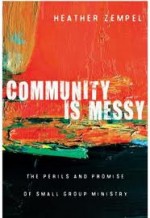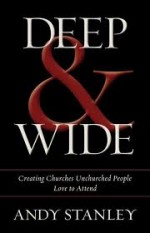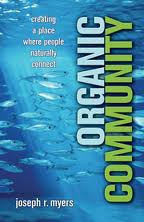Required Reading for the Small Group Pastor: Building a GroupLife Culture
There are books that steer toward a specific system. In the first post in this series I provided a list of the books I consider required reading for the development of grouplife systems. There are also books that do a great job of illustrating how to build a grouplife culture. Here are four of my favorites:
 A must-read in my opinion is Heather Zempel’s Community Is Messy. A talented speaker and writer, Zempel delivered one of the most memorable talks ever at Willow Creek’s grouplife conference. With a title like Community Is Messy: The Perils and Promise of Small Group Ministry, you just know it’s going to be a great read!
A must-read in my opinion is Heather Zempel’s Community Is Messy. A talented speaker and writer, Zempel delivered one of the most memorable talks ever at Willow Creek’s grouplife conference. With a title like Community Is Messy: The Perils and Promise of Small Group Ministry, you just know it’s going to be a great read!
Zempel’s background as an environmental engineer provides some of the best illustrations I’ve come across to describe the messiness of the thing we call community. If you’ve never heard her story about monitoring a pig lagoon (the treatment facility where “the pig poop” is gathered) to figure out how to reduce the stink…you’ve got to read this one. Topping that one might seem a challenge until you come across her story about the development of an aquaponics system that featured tomato plants growing on top of a tilapia fish tank. A fantastically successful experiment with massive unintended consequences.
The best part about Community Is Messy? It goes way beyond a great collection of metaphor and ministry stories. Deeply biblical, these pages are packed with scripture references and classic Bible stories that will definitely find their way into your leadership toolkit. Every chapter is packed with principles and practices that will make their way into your thinking. You can read the rest of my review right here.
 If you only read one book this year, hands down it’s got to be Andy Stanley’s newest, Deep and Wide: Creating Churches Unchurched People Love to Attend.
If you only read one book this year, hands down it’s got to be Andy Stanley’s newest, Deep and Wide: Creating Churches Unchurched People Love to Attend.
My copy is marked up, underlined, starred, and dog-eared. I laughed out loud (Seriously. And I was on a plane!). I got choked up several times. There’s a lot to really love aboutDeep and Wide. In particular, I got a ton out of the section on the importance of the five faith catalysts and how North Point has designed their approach to make experiencing them more likely.
Very, very practical, you’ll find lots of ways to apply the principles of Deep and Wide no matter your specific ministry role. You don’t have to be the senior pastor to end up with a marked up, starred, underlined and dog-eared copy. I found so much here that will work its way into discussions with my team, I don’t even know where to begin!
At the same time both propositional (doesn’t this make sense?) and permission-giving (we’re not saying this is the only way to do church, it’s just the way we’ve learned to do it), I know you’ll come across lots of sections you’ll just have to share with the rest of your staff. You can read my review right here.
 Looking for help in designing an environment that encourages authentic, lasting connections? Organic Community by Joseph R. Myers could be just the ticket to help your congregation move in that direction. In the same way I found Myers’ previous book, The Search to Belong, both intriguing and irritating, there’s a lot to be learned in his newest offering.
Looking for help in designing an environment that encourages authentic, lasting connections? Organic Community by Joseph R. Myers could be just the ticket to help your congregation move in that direction. In the same way I found Myers’ previous book, The Search to Belong, both intriguing and irritating, there’s a lot to be learned in his newest offering.
If you’ve ever attempted to follow someone else’s master plan and found that it really didn’t work in your setting, this will be a book that is both comforting and challenging. Comforting in that it may explain some of the difficulties in porting a strategy into a new setting. Challenging in that becoming an organizational environmentalist is not a problem-free pursuit. Read my complete review right here.
 One of the most challenging new books on small group ministry? In my mind it is Community: Taking Your Small Group Off Life Support by Mars Hill’s Brad House.
One of the most challenging new books on small group ministry? In my mind it is Community: Taking Your Small Group Off Life Support by Mars Hill’s Brad House.
Published by Crossway, this is not your run-of-the-mill book on groups. Although the subtitle suggests that this is a book for small group leaders, it’s really a very thought-provoking read, focused almost entirely on guiding small group ministry point people toward the reframing of their entire ministry.
Almost immediately you will find in this book something different; something very unusual. There is a thoughtful and thought-provoking quality to the writing. It’s not light reading. Instead, Community is the kind of book that you’ll find yourself re-reading, just to be sure you’ve caught the full meaning. And…if your copy is like mine, it’ll be pretty marked up. There’s a lot here.
If you’re looking for practical, hands-on tips and ideas about how to do small group ministry…this is not it. At the same time, if you want to be sure you’re wrestling with the questions and formative thinking essential to building a quality small group ministry…Community has made my list as required reading.

